OpenAI Disrupts Iranian Covert Influence Campaign
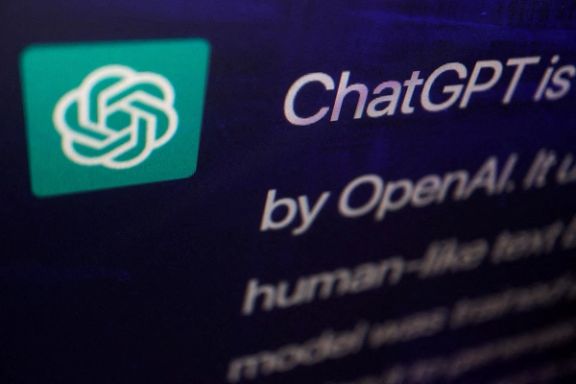
Artificial intelligence company OpenAI says it has disrupted covert influence campaigns originating from Iran, Russia, China and a private company based in Israel.

Artificial intelligence company OpenAI says it has disrupted covert influence campaigns originating from Iran, Russia, China and a private company based in Israel.
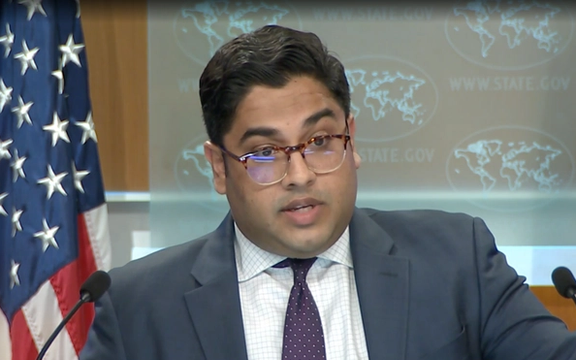
Iran’s Revolutionary Guard, IRGC, “is a menace to the world,” the US State Department spokesperson told reporters on Thursday, when asked about European efforts to designate it as a terrorist organization.
Vedant Patel was asked during the daily briefing about reports that Germany and other EU countries are trying to persuade the European Union to designate the IRGC as a terrorist entity. Patel responded:
“Well, let me just say unequivocally that the IRGC is a menace to the world. We absolutely support efforts to designate the IRGC a terrorist organization, and we support those efforts worldwide. As you know, this is something that the United States has done, already designating the IRGC, and it is a terrible purveyor of terrorism that we believe affects the entire world.”
The US designated the IRGC in 2019, during the Trump administration, while in 2022 there were reports that the Biden White House might lift that designation, during negotiations with Iran to revive the 2015 JCPOA nuclear deal. It was reported in April 2022 that President Joe Biden made a final decision to maintain the status quo and informed Israeli Prime Minister Benjamin Netanyahu, who was concerned about lifting the designation.
Since then, the administration has imposed many sanctions on IRGC-affiliated individuals and entities involved in Tehran’s missile and drone proliferation as well as money laundering and other activities in support of groups in the region that have also been designated as terrorist, such as the Lebanese Hezbollah and Yemen’s Houthis. However, critics say that the administration has not vigorously enforced oil export sanctions on Iran, allowing the Islamic Republic to earn tens of billions of dollars with shipments to China.
Despite the Biden administration’s three-year-long efforts to restore the JCPOA, abandoned by former President Donald Trump, Iran has refused to make a deal, and has increased its uranium enrichment, stockpiling enough fissile material for several nuclear bombs. In recent weeks, Iranian officials have also threatened to shift their nuclear doctrine – an implicit threat to produce warheads.
Reports in the past week have indicated that France, Germany and Britian, signatories of the JCPOA, intend to field a censure resolution against Iranat the upcoming board meeting of the International Atomic Energy Agency (IAEA). Unconfirmed reports have suggested that the Biden administration opposes such a censure, as it still holds secret talks with Tehran.
Patel was asked about these reports during the Thursday briefing. His response indicated that there are still unresolved issues but insisted there is coordination with allies. “We’re continuing to remain tightly coordinated on this with our E3 partners,” he said adding that “No decisions have been taken with respect to any particular upcoming Board of Governors meetings, but I will just say is that we, the United States, are actively increasing pressure on Iran through a combination of sanctions, deterrence, and international isolation.”
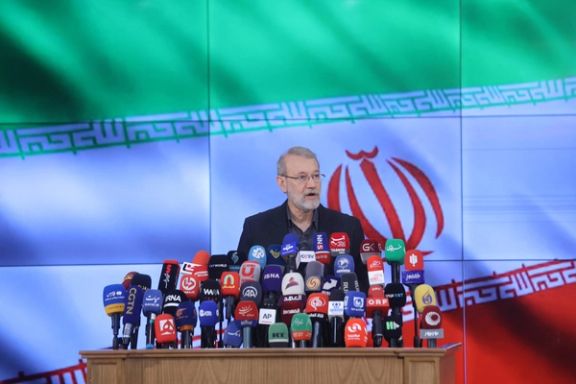
Former Iranian parliament speaker Ali Larijani has officially registered to run in the snap presidential election, scheduled for June 28, following the death of President Ebrahim Raisi in a helicopter crash.
The 66-year-old moderate conservative, who is also a member of the Expediency Discernment Council, went to the Iranian Interior Ministry headquarters in Tehran to register his candidacy on Friday, ending days of speculations about his intentions.
Thursday night, he implicitly confirmed his presence in the elections by publishing a tweet showing a screenshot of his online taxi app with the residence of the Supreme Leader as the origin and two destinations, first the Interior Ministry of and second the office of the President of Iran on Pastor Street, hinting that he will win the election.
It is widely believed that Larijani has sought assurances from Supreme Leader Ali Khamenei to avoid disqualification, a fate he faced during the 2021 elections allegedly due to his daughter's residency in the US.
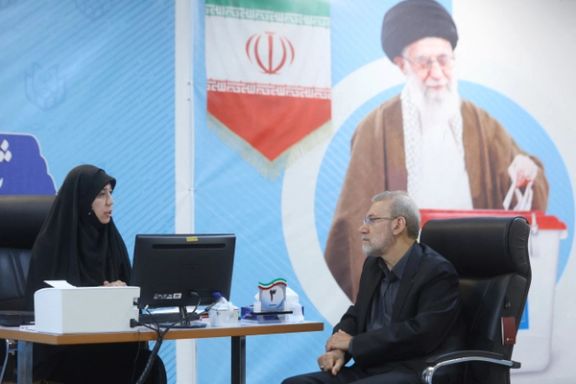
Addressing the reporters, the veteran politician said national unity in society has been significantly harmed by divisions. "In my envisioned government, every skilled and capable individual, regardless of their political affiliation, will be assigned a role. The government will not be the exclusive domain of one party or faction."
Larijani, an insider for many years without political party affiliation, was a top figure in the Islamist political right, known as the Principlist camp. Khamenei appointed him to numerous high-ranking positions, including chief of the state broadcaster (IRIB) and various state councils. He served as secretary of the Supreme National Security Council and Iran's top nuclear negotiator from 2005 to 2007.
Candidate registration is scheduled from May 30 to June 3, with the Guardian Council expected to complete vetting within two weeks. Official campaigning will commence after that, leading up to the election on June 28.
Confirmed known registrants so far include reformist Mostafa Kavakebian and conservative figure Saeed Jalili.
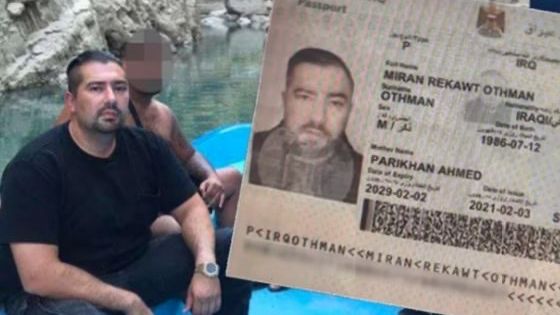
Criminal gangs operating on the behest of the Islamic Republic of Iran are behind a string of terror attacks on Israeli embassies in Europe since October 7, according to Israeli and Swedish Intelligence agencies.
Mossad, the Israeli spy agency, carried out an investigation alongside European counterparts after an explosive device, reportedly a hand grenade, was found inside the grounds of the Israeli embassy in Stockholm in January.
It was destroyed by the Swedish national bomb squad.
Swedish media also reported a suspected shooting incident near Israel’s embassy in Stockholm in May.
On Thursday, Sweden’s domestic security agency accused Iran of using criminal networks as proxy to target Israeli and/or Jewish interests in Sweden.
Iranian dissidents and members of the Iranian diaspora are also reportedly among the targets of the Islamic Republic inside the Scandinavian country.
"The security-threatening activities of the Iranian regime and its security services have also targeted representatives of other states, including Israel, that Iran regards as enemies of its regime. Such activities could be carried out with a view to harming Israeli and Jewish interests, targets, and activities in Sweden," the Swedish Security Service said in a news release.
The news release identified Iran, in addition to Russia and China, as the "greatest security threats to Sweden."
The head of Sweden’s security service's counterintelligence, Daniel Stenling, raised the accusations at a news conference Thursday, according to Reuters.
Israeli media, including the Times of Israel and the Jerusalem Post, reported that an organized crime ring in Sweden called Foxtrot and rival gang Rumba were behind separate attacks, all under Iran's direction, according to Mossad.
According to Israeli media, Foxtrot is one of the largest criminal organizations in Sweden and operates in other European countries as well. The gang is known for murders and large-scale drug trafficking.
Foxtrot's head, Rawa Majid, a Swedish citizen of Kurdish origin, is alleged to have been arrested in Iran for criminal activity, then recruited for terror, and allegedly released to carry out terror on Tehran's behalf. He is wanted by the Interpol.
Rumba, headed by Ismail Abdo, was behind the May 17 gunshots near Israel’s embassy in Sweden, according to Israeli media citing the Israeli Intelligence agency.
Alex Selsky, an advisor to the Middle East Forum and former advisor to Israeli Prime Minister Benjamin Netanyahu, told Iran International from Israel, that Iran's use of criminal networks to carry out terror on European soil, shows two things: Iran's determination to commit acts of terror, and that it needs to pay for recruitment.
"I think they don't have enough structured operation, which might show that they don't really have such a big support. They just buy it. They buy the operation," said Selsky.
Jason Brodsky, the policy director of United Against Nuclear Iran (UANI), told Iran International that while he's not surprised, he is concerned.
"It points to the lack of deterrence in the West with respect to Iran. The Islamic Republic feels confident enough that it could get away with literally murder, in trying to harm or assassinate Western nationals on European soil without it paying a significant price," said Brodsky.
He said Iran's use of criminal gangs in the West is the modus operandi of the Iranian regime.
"Plausible deniability," said Brodsky "to try to shield the system from blame whenever these plots are busted or God forbid, a plot is successful."
Brodsky said either Iran's Intelligence Ministry typically or the Islamic Revolutionary Guard Corps (IRGC) link up with these criminal organizations.
Both analysts, Brodsky and Selsky, said Thursday's revelations are more proof of the need to proscribe the IRGC as a terrorist entity on the continent.
"What else we must show to Europeans to wake them up?" said Selsky.
Israeli media reported that Foxtrot and Rumba receive funding directly from Iran, and said Mossad believes Iran is taking advantage of rising antisemitism.
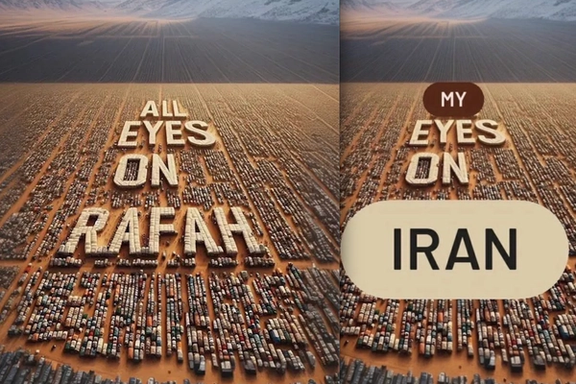
A pro-Palestinian social media campaign using an image with the text ‘All Eyes on Rafah’ has raised huge controversy among Iranians. Those who oppose the campaign have launched their own ‘All Eyes on Iran’ version.
The AI generated image of tents in a camp of displaced Gazan Palestinians arranged to read ‘All Eyes on Rafah’ turns the spotlight on the situation of the Palestinians who have been displaced after Israel’s deadly offensive.
The image which was created and shared as an Instagram ‘story’ template by a Malaysian Instagrammer named Shahv4012 has been shared by nearly 45 million users of the platform including some Iranian hardliners. The campaign has also found its way to other platforms such as X.
Activists and social media users opposing the campaign argue that Hamas is directly responsible for the war in Gaza and the deaths of Palestinian civilians and children, whom it uses as 'human shields.' They are part of a large segment of Iranians who say their own people have been suffering under the repression of the Islamic Republic, which also supports and arms Hamas with their money.
“It is Hamas that has forced Israel to go to war, with heinous crimes against Israeli civilians. It wants to force Israel to end the war using the civilian card, now that it is on the verge of destruction. My anger and curses over the killing of Palestinian children are all directed at Hamas terrorists,” journalist Sheragim Zand said in a tweet May 29.
All Eyes on Rafah posted by a student Basij militia group in Iran's Sistan and Baluchestan
“Defending Israel is defending morality,” another opponent, pro-monarchy activist Ali Ashtari, tweeted.
Ashtari argued that the only way for Israel to eliminate the threat of Hamas is a military one. “But unfortunately, a military attack, especially in the densely populated area of Gaza, causes civilian casualties too,” he maintained while accusing Hamas of intentionally seeking higher civilian casualties to force the international community to stop Israel’s military operations.
Another expatriate journalist, Neda Sanji, however, in her tweets warned about “fake news and fallacies” which she listed as “opposing the massacre in Gaza equals support for the Islamic Republic”, “Those who oppose the Gaza massacre were silent about the [government’s] killing of the Iranian people”, “opposing the massacre in Gaza equals supporting Hamas”, and “Israel has no choice other than doing what it does to destroy Hamas”.
Post by former football star, Ali Karimi, is now a social heavyweight in Iran
Sanji also maintained that the social media controversy would benefit the Islamic Republic’s cyber army. “The dust will eventually settle but humanity will be scarred [forever],” she wrote.
Many celebrities in Iran have posted the image as a ‘story’ on their Instagram accounts in the past few days.
Apparently referring to the current controversy over Gaza, Fariborz Karami-Zand, an expatriate activist with a large social media following, in a tweet Thursday criticized celebrities for “closing their eyes to the crimes of the Islamic Republic”. “Why are they silent about issues related to Iran and their fellow countrymen?” he asked.
Instagram stories of Iranian celebrities in support of Palestinians
In protest against the government’s increasing political and financial support for Hamas and Lebanese Hezbollah, some demonstrators chanted “Neither Gaza nor Lebanon, I’ll sacrifice my life for Iran” during the protests that followed Iran's disputed 2009 presidential elections. This marked the first time such a slogan was used in the history of the Islamic Republic.
The slogan has since then become one of the top slogans during anti-government protests.
Supreme Leader Ali Khamenei has repeatedly condemned this slogan. In a Friday sermon in January 2020, following widespread anti-government protests two months earlier, he accused those who chanted it of hypocrisy. “These people have never sacrificed their lives for Iran or forsaken their comfort and interests for the sake of the country’s security,” he said.
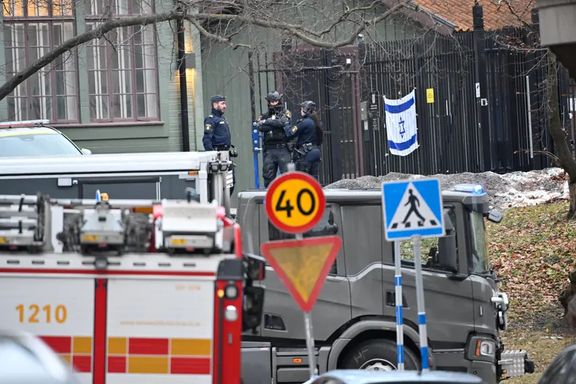
Israel's Mossad has revealed the foiling of multiple Iran-backed terror attacks against Israeli embassies across Europe including Belgium and Sweden.
According to Mossad's statement, with just two months until the Paris Olympics 2024, Iran is accused of fostering terrorism on European soil. It is alleged that Iran has commandeered European criminal networks to execute its directives, involving violent acts like grenade attacks and shootings at Israeli embassies.
The recent findings are part of an extensive intelligence operation that spanned multiple European countries, involving close cooperation between Mossad, the Intelligence and Special Task Force, and the General Security Service. Their efforts have reportedly led to the discovery of major criminal organizations operating under instructions from Iran, aiming to inflict harm on identified Israeli targets.
An incident last weekend saw two grenades thrown at the Israeli embassy in Belgium, fortunately resulting in no casualties or damage. The event mirrored a similar attempt in Stockholm earlier this year, where a grenade aimed at the Israeli embassy failed to detonate.
The investigation has put a spotlight on the Swedish criminal organization Foxtrot and its leader Rua Majid, who worked under Iranian guidance. Majid, a fugitive operating from Iran, has been implicated in orchestrating attacks targeting Israeli and Jewish entities across Europe.
The use of criminal proxies by Iranian terrorist organizations is a strategic move to minimize direct political backlash while promoting acts of terrorism while Iran continues its proxy war against Israel. Despite the tactics, Mossad's collaborative efforts with global security agencies have repeatedly exposed Iran's involvement, thwarting numerous planned attacks and highlighting the ongoing threat posed by such operations.
Last year, Mossad chief David Barnea revealed the agency had foiled dozens of Iranian plots against Jewish and Israeli targets across the world from South America to Europe.
The company, which launched AI system ChatGPT in 2022, said on Thursday that it identified five campaigns involving “deceptive attempts to manipulate public opinion or influence political outcomes without revealing the true identity or intentions of the actors behind them.”
Open AI said that it terminated accounts associated with an Iranian network called International Union of Virtual Media, two Russian operations, dubbed Bad Grammer and Doppelganger; a Chinese campaign known as Spamouflage; and an Israeli operation dubbed Zero Zeno.
The threat actors used OpenAI's powerful language models for tasks like generating text and images that were posted across social media as well as comments, articles, social media profiles, and debugging code for bots and websites. According to OpenAI, in some cases the ChatGPT tools were exploited to produce content with “fewer language errors than would have been possible for human operators.”
The Iranian group -- the International Union of Virtual Media -- was disrupted for using OpenAI to create articles, headlines and content posted on Iranian state-linked websites, the company said.
The company led by CEO Sam Altman said these operations "do not appear to have benefited from meaningfully increased audience engagement or reach as a result of our services."
“We are committed to developing safe and responsible AI, which involves designing our models with safety in mind and proactively intervening against malicious use,” the California-based start-up said in a statement posted on its website.
Microsoft disclosed in February that state-backed hackers from Iran, Russia and China have been leveraging tools developed by Microsoft-backed OpenAI to enhance their cyber espionage capabilities.
It followed revelations in November that Microsoft’s Threat Analysis Center (MTAC) had issued a warning that Iran, Russia and China are likely to plan to influence the upcoming elections in the United States and other countries later this year.